Module 6 Films and TV Programmes grammar
文档属性
| 名称 | Module 6 Films and TV Programmes grammar | 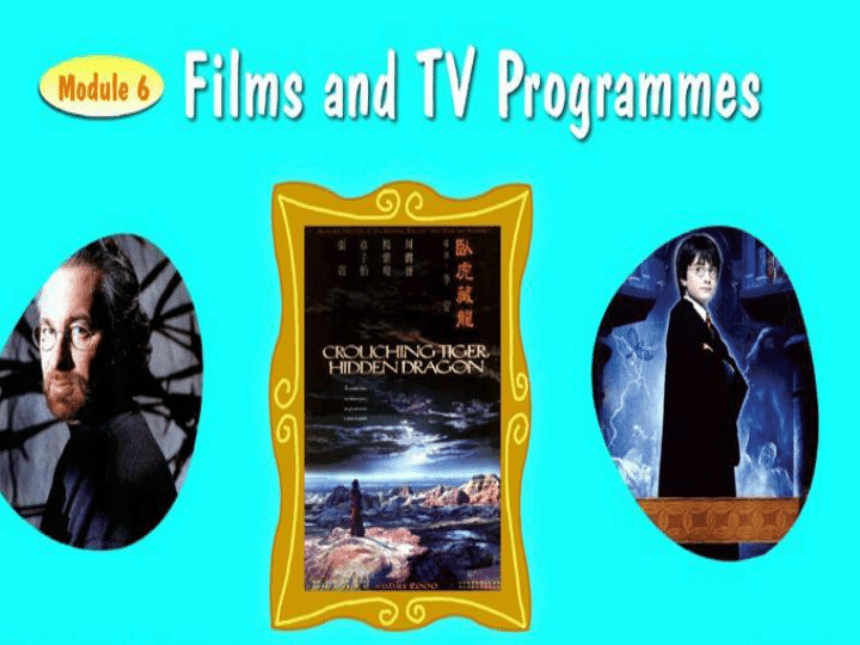 | |
| 格式 | rar | ||
| 文件大小 | 443.2KB | ||
| 资源类型 | 教案 | ||
| 版本资源 | 外研版 | ||
| 科目 | 英语 | ||
| 更新时间 | 2010-05-13 20:38:00 | ||
图片预览

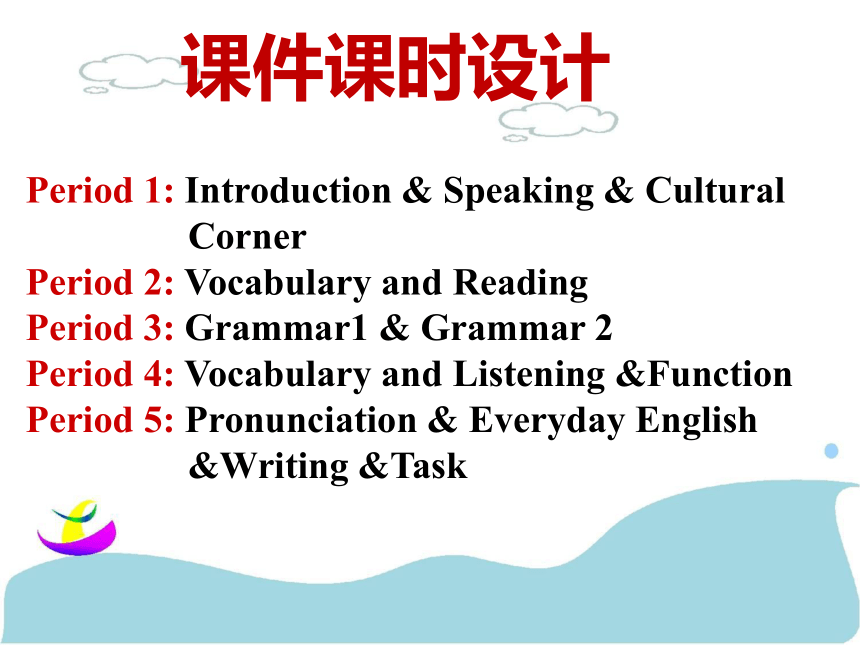
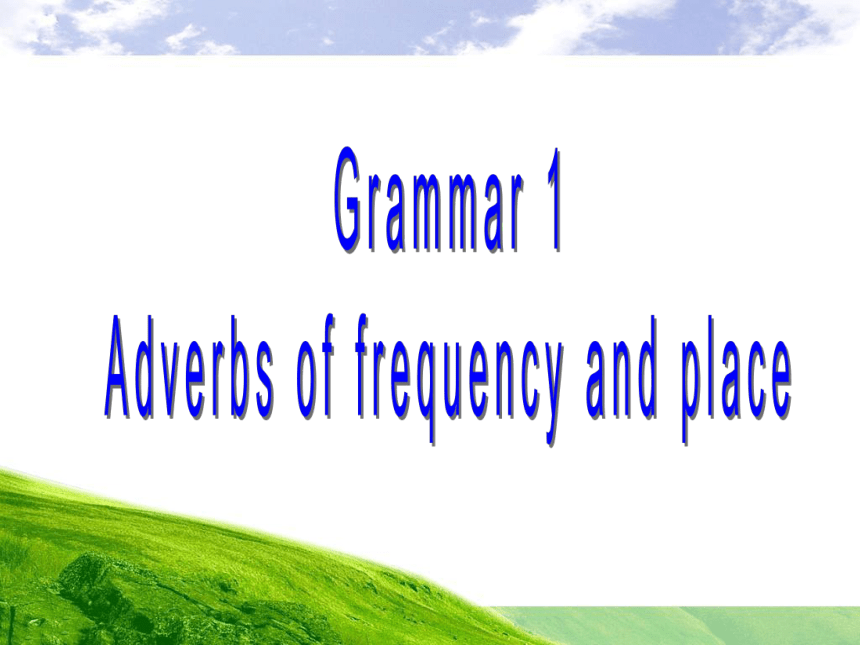
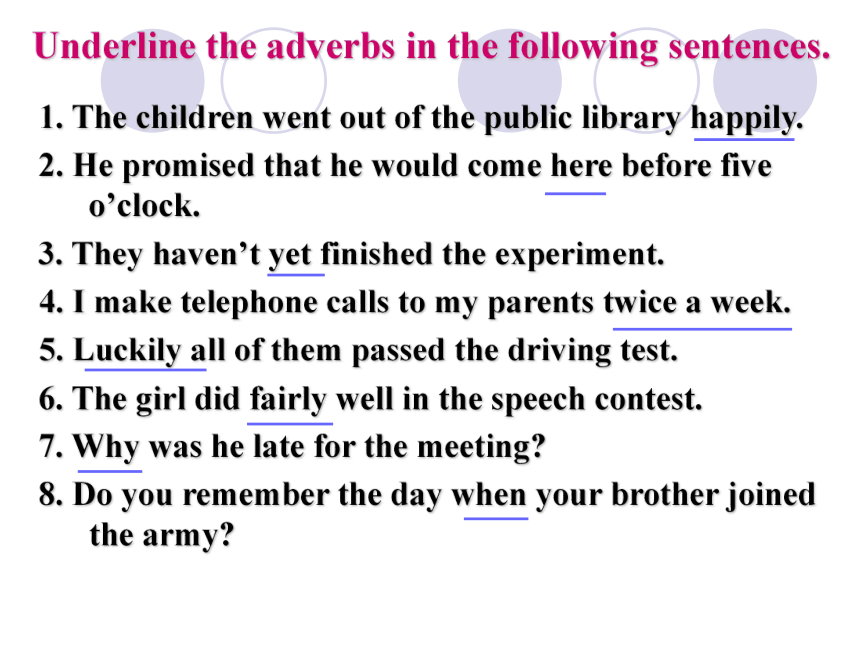
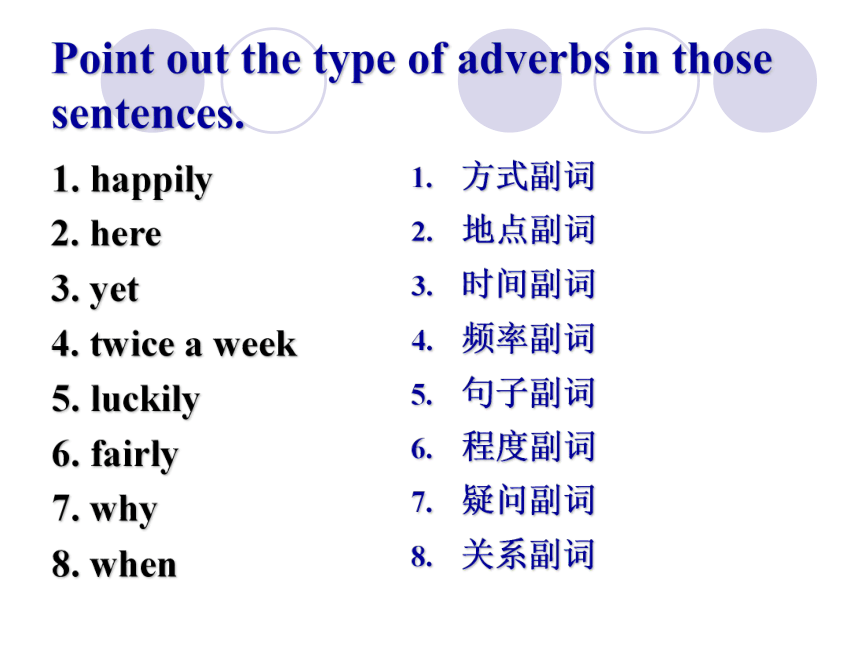

文档简介
课件12张PPT。课件课时设计Period 1: Introduction & Speaking & Cultural
Corner
Period 2: Vocabulary and Reading
Period 3: Grammar1 & Grammar 2
Period 4: Vocabulary and Listening &Function
Period 5: Pronunciation & Everyday English
&Writing &TaskGrammar 1
Adverbs of frequency and placeUnderline the adverbs in the following sentences.1. The children went out of the public library happily.
2. He promised that he would come here before five o’clock.
3. They haven’t yet finished the experiment.
4. I make telephone calls to my parents twice a week.
5. Luckily all of them passed the driving test.
6. The girl did fairly well in the speech contest.
7. Why was he late for the meeting?
8. Do you remember the day when your brother joined the army?Point out the type of adverbs in those sentences.1. happily
2. here
3. yet
4. twice a week
5. luckily
6. fairly
7. why
8. when方式副词
地点副词
时间副词
频率副词
句子副词
程度副词
疑问副词
关系副词Conclusion表确切频率的副词:daily, weekly, monthly, yearly, twice a week/ month/ year, etc..
表不确切频率 副词:always, often, usually, sometimes, occasionally, frequently, continually, repeatedly, once, ever, never, rarely, seldom, etc..频率副词在句中的位置
通常用在实义动词之前
I often do some shopping on weekends.
通常放在be动词(am, is are, was, were)后。
She is often late for school.
通常在助动词(will, should, have)之后。
I have never seen him since we parted.表示地点的副词:here, there, home, upstairs, downstairs, anywhere, everywhere, nowhere, somewhere, abroad, elsewhere, etc
表示位置关系 副词:above, below, down, up, out, in, across, back, along, over, round, around, away, near, off, on, inside, outside, past, etc地点副词在句中的位置 地点副词常放在动词后面,如果是及物动词,一般就放在宾语后面。如:
I remember having seen him somewhere.
Wuxia films are popular in China.
地点副词和时间副词并列使用时,一般要把地点副词放在时间副词之前。如:
We had a meeting here yesterday.
He did the work carefully here yesterday.
如果地点状语很长时,也可以放在时间状语之后。如:
He was born in 1940 in a small village at the foot of Mount Tai. Conclusion几个副词同时出现在一个句子中时,一般次序是:
方式副词+地点副词+时间副词
They were all working hard in the fields at 10:00 yesterday.副词的构成1. 许多副词,尤其是情状副词,是由形容词加 ly 或其变体构成的。 规则1: 一般直接加ly。 brave → bravely; quiet → quietly He was standing there quietly and smiling at me. 他静静地站在那里,冲着我微笑。 规则2: 以ble, gle 或ple 作结尾的,去掉e加y。 able → ably; simple → simply 规则3: 以子音+y作结尾的,将y改成i,再加ly。 angry →angrily; busy →busily; easy →easily; happy →happily I was busily cooking the fish in the kitchen. 我正在厨房忙着煮鱼。 规则4: 以ll作结尾的, 只加y。
full → fully; dull → dully
规则5:以ful为字尾的,直接加ly。
useful → usefully; harmful → harmfully
Corner
Period 2: Vocabulary and Reading
Period 3: Grammar1 & Grammar 2
Period 4: Vocabulary and Listening &Function
Period 5: Pronunciation & Everyday English
&Writing &TaskGrammar 1
Adverbs of frequency and placeUnderline the adverbs in the following sentences.1. The children went out of the public library happily.
2. He promised that he would come here before five o’clock.
3. They haven’t yet finished the experiment.
4. I make telephone calls to my parents twice a week.
5. Luckily all of them passed the driving test.
6. The girl did fairly well in the speech contest.
7. Why was he late for the meeting?
8. Do you remember the day when your brother joined the army?Point out the type of adverbs in those sentences.1. happily
2. here
3. yet
4. twice a week
5. luckily
6. fairly
7. why
8. when方式副词
地点副词
时间副词
频率副词
句子副词
程度副词
疑问副词
关系副词Conclusion表确切频率的副词:daily, weekly, monthly, yearly, twice a week/ month/ year, etc..
表不确切频率 副词:always, often, usually, sometimes, occasionally, frequently, continually, repeatedly, once, ever, never, rarely, seldom, etc..频率副词在句中的位置
通常用在实义动词之前
I often do some shopping on weekends.
通常放在be动词(am, is are, was, were)后。
She is often late for school.
通常在助动词(will, should, have)之后。
I have never seen him since we parted.表示地点的副词:here, there, home, upstairs, downstairs, anywhere, everywhere, nowhere, somewhere, abroad, elsewhere, etc
表示位置关系 副词:above, below, down, up, out, in, across, back, along, over, round, around, away, near, off, on, inside, outside, past, etc地点副词在句中的位置 地点副词常放在动词后面,如果是及物动词,一般就放在宾语后面。如:
I remember having seen him somewhere.
Wuxia films are popular in China.
地点副词和时间副词并列使用时,一般要把地点副词放在时间副词之前。如:
We had a meeting here yesterday.
He did the work carefully here yesterday.
如果地点状语很长时,也可以放在时间状语之后。如:
He was born in 1940 in a small village at the foot of Mount Tai. Conclusion几个副词同时出现在一个句子中时,一般次序是:
方式副词+地点副词+时间副词
They were all working hard in the fields at 10:00 yesterday.副词的构成1. 许多副词,尤其是情状副词,是由形容词加 ly 或其变体构成的。 规则1: 一般直接加ly。 brave → bravely; quiet → quietly He was standing there quietly and smiling at me. 他静静地站在那里,冲着我微笑。 规则2: 以ble, gle 或ple 作结尾的,去掉e加y。 able → ably; simple → simply 规则3: 以子音+y作结尾的,将y改成i,再加ly。 angry →angrily; busy →busily; easy →easily; happy →happily I was busily cooking the fish in the kitchen. 我正在厨房忙着煮鱼。 规则4: 以ll作结尾的, 只加y。
full → fully; dull → dully
规则5:以ful为字尾的,直接加ly。
useful → usefully; harmful → harmfully
